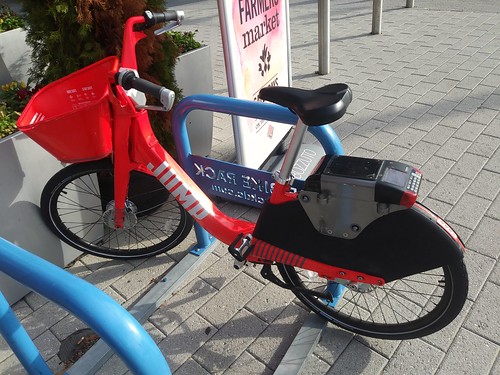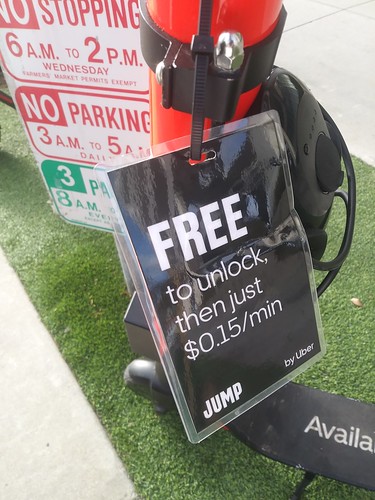More points about e-scooters
1. They aren't built very well. The Lime scooters are subject to fires ("Almost every electric scooter in the world comes from this Chinese company," St. Louis Post-Dispatch). People have died because they've broken while riding. Bird is engaged in designing its own ("Bird unveils custom electric scooters and delivery," TechCrunch).
2. There is a cheap kit you can buy to break the lock of a Bird scooter and take it over for personal use ("$30 plug-and-play kit converts a Bird scooter into a "personal scooter," Boing Boing).
That's another term for stealing. And it doesn't bode well for the industry. Although it only works for the type of scooter, a Xiaomi MIJIA M365.
3. Scooter charging gig economy is Social Darwinism at its worst. The problem with gig economy firms like ride hailing or it seems, scooter charging, is that there are no barriers to entry to participate.
Since there is only so much business to go around, it becomes cut throat to make a living. In effect, a "race to the bottom." Why not just set it up so that people are assigned x number of scooters to pick up, charge, and return, rather than make it a form of "Marathon Man"?
-- "Inside the scooter side hustle: Charging for Lime and Bird is a new cutthroat gig in St. Louis," St. Louis Post-Dispatch
 4. Will dockless e-scooters go the way of dockless bikes? After a flurry of expansion, most non-e-bike dockless bike share deployments have faded away.
4. Will dockless e-scooters go the way of dockless bikes? After a flurry of expansion, most non-e-bike dockless bike share deployments have faded away.Jump, the initial dockless firm offering e-bikes exclusively, along with hardened locking systems, is still in the game, and has since been acquired by Uber.
LimeBike has since added e-bikes and e-scooters to its fleet (and in Seattle, cars). As mentioned in the previous entry, like Tesla, Lime is on the verge of introducing "mobility lifestyle stores" to promote their products.
 Jump has introduced e-scooters and use of the e-bikes and scooters is initiated through the Uber app. Jump's pricing for e-scooters, unlike for its bikes, removes the base charge of $1 per ride that Bird charges, charging only on a per minute basis.
Jump has introduced e-scooters and use of the e-bikes and scooters is initiated through the Uber app. Jump's pricing for e-scooters, unlike for its bikes, removes the base charge of $1 per ride that Bird charges, charging only on a per minute basis.Ofo, one of the major firms, now limited to Asia after a flurry around the world, is on the verge of bankruptcy ("Chinese bike-sharing startup Ofo considering bankruptcy," Reuters).
Some firms will get acquired.
-- "Holy s***! Lyft acquires bike share operator Motivate + other bike sharing news," 2018
All with have to broaden their lines of business in order to remain in business, because in North America, from the standpoint of the Rogers diffusion of innovation curve, sustainable mobility is still at the early adopter phase.
-- "I finally figured out why mobility services are buying other mobility services: they're acquiring customers already familiar with smart mobility," 2018
-- "Diffusion Innovation Theory," Boston University webpage
Without the introduction of hard core locking systems, e-scooters are likely to go the way of dockless regular bike share as unlike e-bikes, it doesn't allow for premium pricing.
 5. Will firms make money at it? Probably not. There's a reason that most transportation is subsidized. If you're a regular micromobility user, it makes more sense to buy your own scooter rather than pay per minute charges. If you're an occasional user, you're not generating enough money to make it worthwhile for the firm offering the service.
5. Will firms make money at it? Probably not. There's a reason that most transportation is subsidized. If you're a regular micromobility user, it makes more sense to buy your own scooter rather than pay per minute charges. If you're an occasional user, you're not generating enough money to make it worthwhile for the firm offering the service.6. The need to create regional transport associations that include private firms. From a public policy standpoint, is it worth subsidizing the private sector to provide this service, especially when the firms are pretty resistant to regulation?
I advocate for the creation of integrated transportation planning and operation organizations operating on a large scale geography, modeled after the German system.
-- "The answer is: Create a single multi-state/regional multi-modal transit planning, management, and operations authority association," 2017
-- "Verkehrsverbund: The evolution and spread of fully integrated regional public transport in Germany, Austria, and Switzerland,"Ralph Buehler, John Pucher & Oliver Dümmler, International Journal of Sustainable Transportation (2018)
-- Transport Alliances - – Promoting Cooperation and. Integration to offer a more attractive and efficient Public Transport, VDV, trade association for German transport associations
Dockless bikes and scooters indicate a need to think about how to incorporate the private sector into transportation planning in a meaningful way at the regional scale.
-- "Car share users are getting abused by the cities that ostensibly support car sharing as a form of sustainable mobility," 2016
-- "A new thought about Uber and Lyft as mobility/transportation services operating on a national footprint," 2017
Labels: e-scooters, micromobility, sustainable mobility platform, transportation planning



1 Comments:
Hi everyone, Are you into trading or just wish to give it a try, please becareful on the platform you choose to invest on and the manager you choose to manage your account because that’s where failure starts from be wise. After reading so much comment i had to give trading tips a try, I have to come to the conclusion that binary options pays massively but the masses has refused to show us the right way to earn That’s why I have to give trading tips the accolades because they have been so helpful to traders . For a free masterclass strategy kindly contact maryshea03@gmail.com for a free masterclass strategy. She'll give you a free tutors on how you can earn and recover your losses in trading for free..
Post a Comment
<< Home